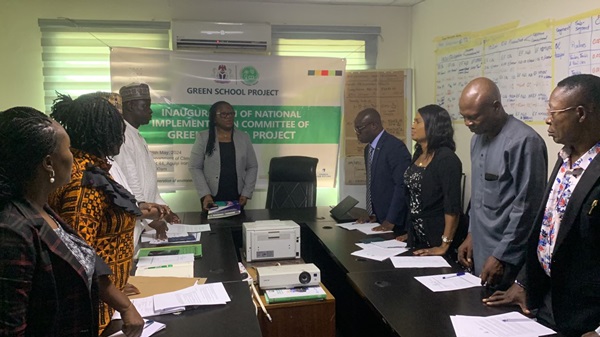
A communique issued after the stakeholders’ review and validation meetings on the Draft National Framework of the National Green Schools Project has called for the implementation of crucial green practices in schools across Nigeria.
The communique, signed by the national project coordinator for the National Green Schools Project, Unyime Robinson; Deputy director of the Federal Ministry of Environment, Musa Yauri and representatives from the federal ministries of Education and Environment, the National Universities Commission, Universal Basic Education, Federal Ministry of Agriculture and Food Sufficiency, FCT Education Resource Centre, Nigeria Police Force Education Unit, Federal Department of Forestry, National Commission for Colleges of Education, as well as school administrators, teachers, environmental experts and civil society organisations, emphasised the urgent need for sustainable practices in educational institutions.
The meetings aimed to review, discuss and validate the draft framework, which promotes environmental awareness, sustainability and green practices in schools across Nigeria.
According to the communique, attendees endorsed several key environmental initiatives, including the establishment of orchards within school premises, waste management systems, renewable energy adoption, water conservation and sustainable agricultural practices, to be incorporated through Green Clubs, also known as Green Schools Champions.
The communique stated, “It was resolved that teachers, school administrators and relevant stakeholders will undergo capacity-building programs to equip them with the necessary knowledge and skills to effectively implement the National Green Schools Project.”
Stakeholders highlighted the importance of partnerships with private sector entities, non-governmental organisations and international development partners to mobilise resources, share best practices and expand the project’s sustainability.
A comprehensive monitoring and evaluation framework will be established to track progress, assess the Green Schools Project’s impact and ensure continuous improvements in environmental practices in schools.
The communique also noted that while environmental education exists in Nigeria’s school curriculum, further integration is needed to foster a culture of sustainability among students. This would include the development of information, education and communication (IEC) materials on topics like climate change, biodiversity and eco-friendly practices.
Local communities will be engaged in environmental activities initiated by schools to enhance broader awareness and grassroots participation in green initiatives.
The stakeholders committed to supporting the successful implementation of the National Green Schools Project, recognising its critical role in fostering an environmentally conscious generation.
With the framework validated, the National Launch of the Green Schools Project is proposed for October 29, 2024, pending approval by relevant authorities.
The meetings commended all contributors, especially the National Implementation Committee, which has been restructured into the National Steering Committee, for their active involvement and contributions during the review and validation process. They expressed optimism for the transformation of schools into hubs of environmental sustainability.
The communique also praised the Federal Ministry of Environment’s department of climate change for its coordination, along with the African Centre for Environment, Agriculture & Rural Development and international partners, Zenaga Foundation and Sports for Future, for their resources and initial support in piloting the Green Schools Project in Nigeria.


